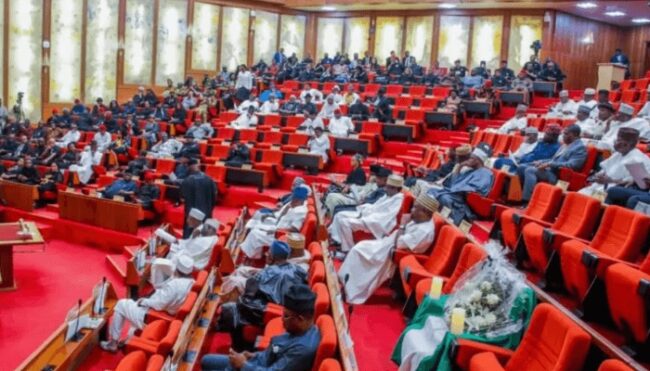In a move to strengthen the Central Bank of Nigeria (CBN) in performing its monetary and fiscal policy duties, the Senate has proposed far-reaching amendments to the establishment Act, including pegging the tenure of the Governor at a single term of six (6) years.
The non-renewable term is also applicable to the deputy governors of the bank. Both the governor and the deputy governors currently serve a renewable term of five (5) years.
The proposals were contained in the amendment bill, which was sponsored by the Chairman of the Senate Committee on Banking, Insurance, and other Financial Institutions, Senator Adetokumbo Ashiru, and 41 other lawmakers.
The bill, titled “Bill for an Act to Amend the Central Bank of Nigeria Act No 7 of 2007 to Further Empower the Bank to Carry Out its Principal Objectives in Line with Section 2 of the Act, and for Other Related Matters,” passed the second reading on Tuesday.
Defending the new single term of six years, Abiru, in the lead debate, said, “This is the practice adopted by many independent Banks such as the US Federal Reserve and the European Central Bank where their Chief Executive Officers serve only one non-renewable term.
“Empirical evidence shows that a single term for the members of the Executive and Board members of central banks helps to reduce political influence on monetary policy decisions and the time inconsistency problem associated with non-independent central banks.”
In the event of a vacancy created by the death or resignation of the governor/deputy governor, the bill proposes that “the President can appoint an acting Governor in the interim pending the appointment of a substantive Governor or Deputy Governor.
“Where a substantive appointment is made, such appointment will be for a fresh term rather than serving the tenure of the previous Governor or Deputy Governor.”
For the five external directors who serve on the board of the bank, the Senate proposes a single, non-renewable term of five years, as against the current renewable term of four years.
Another key proposal is limiting the repayment period of Ways and Means advances to the government to fund its budget deficit.
Although the Senate proposes to raise the advances to 10% from the current 5% of the previous revenue of the government, it pegs the repayment period “within three months.” Under the extant law, the government is to pay back the money at the end of the financial year.
According to the new bill, the new proposal will guard against the recent example with the administration of former President Muhammadu Buhari, where the CBN allegedly abused the Ways and Means advances to the tune of N30 trillion.
Abiru stated, “In order to firm up this provision and prevent a repeat of the recent experience in which the Bank’s Ways and Means have fueled inflation and significantly distorted economic management, the bill proposes the following:
any such direct advance to the Government should not exceed 10% of average government actual revenues during the preceding three years.
“For the purpose of determining the government’s actual revenue, proceeds from asset sales shall be excluded to avoid capturing revenues from exceptional items.
“Such temporary loans should be repaid in full within three months from the date it is made available. This is consistent with global practice. The current provision which stipulates before the end of the fiscal year is prone to abuse as it creates a window for the government to obtain overdrafts from the Bank in January and wait until December to make repayment.
“In order to minimize default risk, any sum which becomes outstanding at the end of the expiration of the credit period should be held against and recovered from the proportion of the Federal Government’s FAAC Receipts.”
The bill, which also proposes a new committee to “coordinate” monetary and fiscal policies, seeks to raise the authorized capital of the CBN from N100 billion to N1 trillion due to the impact and devaluation on the capital base.
It added that the amount may be increased from time-to-time “as the Government may approve either by way of transfers from the General Reserve Fund or by such other means as the Government, in consultation with the Board, may approve.”
According to the Senate, the current law “made no provision for coordination of monetary and fiscal policies, which is the reason that monetary policies of the bank often diverge from fiscal policies to the detriment of the economy.”
It added that the function of the committee “shall include: setting internally consistent targets of monetary and fiscal policies that are conducive to controlling inflation and promoting financial conditions for sustainable economic growth;
and applying caps to any fiscal deficit at a level that can be financed without having recourse to direct monetary financing from the Bank, that is Ways and Means.”
The membership of the committee includes the Minister of Finance who shall be the Chairman; Minister of Budget and Economic Planning;
Minister of Industry Trade and Investment; Minister of Agriculture;
Governor of the Central Bank of Nigeria; Chief Economic Adviser to the President; and the Director-General of the Securities and Exchange Commission.
ALSO READ:Speaker Abbas seeks lawmakers’ inclusion in NIPSS training
On the issuance of a new legal tender or policy to redesign the naira, the new bill proposes that adequate notice, not less than one year, should be given to Nigerians to prepare them for the change.
It further provides that, “The entire program should last at least two years from the date of the announcement of its intention;
Throughout the duration of the program, both the old and new currency notes and coins are expected to serve as legal tender simultaneously.
“The withdrawal of the old legal tender should be carried out in phases and in a manner that does not cause any distortion to economic activities.
“The Bank should be in possession of sufficient new currency (not less than 70% of the old stock of currency to be withdrawn) before embarking on such a program.”

